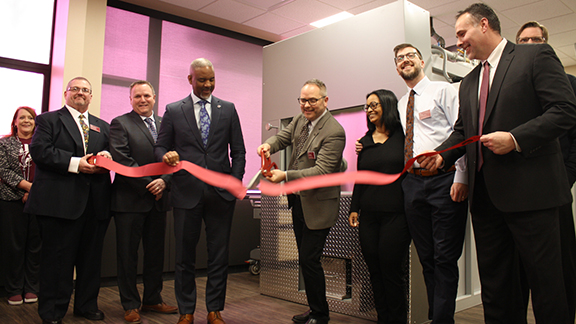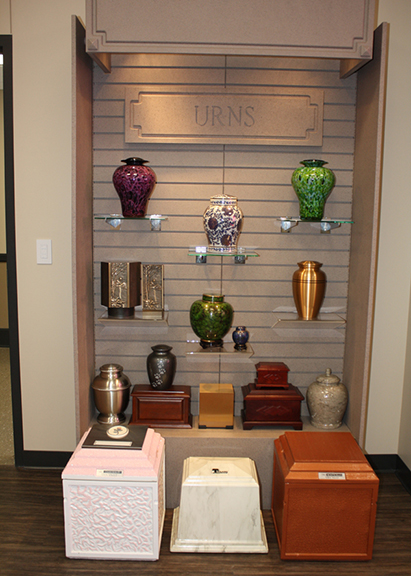by Christi Mathis
CARBONDALE, Ill. — A love of science and the desire for a career that really helps people drew Emily Bender toward a career in mortuary science. With the decision made, she knew her educational preparation “could only be Southern Illinois University Carbondale” as SIU offers the state’s only mortuary science and funeral services bachelor’s degree program and one of just six in the country. Now, Bender said, the program’s recent addition of the only university-housed crematory in the United States has made her even happier with her choice.

Faculty and administration participating in the ribbon cutting for SIU’s new crematory were, left to right: Robert Broomfield, MSFS assistant instructor; Robert Morgan, dean of the College of Health and Human Sciences; Chancellor Austin Lane; Anthony Fleege, mortuary science and funeral service program director and associate professor; Monica Gray, assistant professor of practice; Sam Perry, assistant lecturer; and Scott Collins, director of the School of Health Sciences. Photo provided
“The crematory really gives me, as well as other students, confidence. The practice we will get from having an on-site crematory reaffirms we are capable of providing this service to families and doing it correctly just as soon as we enter the workforce,” Bender, a sophomore in mortuary science and funeral service (MSFS) from Normal, Illinois, said. “This is another addition to SIU’s mortuary science program that allows students to be a step ahead.
“Mortuary science combines my favorite subjects, from anatomy to art, and it is really meaningful to know that I get the honor of taking care of someone’s loved one for the last time. The humanity of funeral service drew me to pick this major. Being able to obtain a bachelor’s degree in mortuary science is unique, as most programs are associate only. A 4-year degree allows for a more open path to continuing education, and it makes students more competitive postgraduation. SIU also has a beautiful, accessible campus with opportunities for research and experience that made it an obvious yes. The experience we get from program components like the crematory, the embalming lab and everything else reaffirms that I’m in the exact field I’m supposed to be in and training for it in the best place.”
SIU’s mortuary science program will also help address an anticipated shortage of funeral service industry workers in the next five years.
Crematory a decade in the making, offering rare experience
Anthony Fleege, mortuary science and funeral service program director and associate professor, said while attending a conference 10 years ago, a colleague from another school was taking a crematory operator’s course and commented that mortuary schools should teach the course on campus. Fleege agreed, noting the nationwide shift toward cremation.

The U.S. cremation rate was 57.4 percentage in 2022, meaning more than half of all final dispositions end in cremation rather than burial, according to Fleege. While the Illinois cremation rate mirrors the national rate, some states are much higher, led by Nevada with 82 percent, so the need is great.
Fleege pitched the idea of adding a crematory and the option for a crematory operator’s license at SIU, and Scott Collins, director of the School of Health Sciences, helped carry the plan forward. Thanks largely to gifts from private donors, the SIU School of Medicine, the dean of the College of Health and Human Sciences, the School of Health Sciences and generous support from the SIU Foundation, the unit from Crematory Systems of South Holland is now in place at SIU.
From now on, all SIU’s mortuary science and funeral service graduates will not only get hands-on training operating a crematory with the addition of a cremation class to the curriculum, but they will also complete school as a certified crematory operator as recognized by the Illinois comptroller’s office, Fleege said.
“This acquisition helps keep us at the forefront of mortuary science education,” Fleege said. “The primary goal for the crematory is to give students practical experience on campus with cremation of the cadavers used for medical education purposes. Our students will leave college with the necessary tools in their tool belt to get licensed in any state and be able to immediately make an impact as a funeral director, embalmer or crematory operator. SIU is dedicated to student success, and our mortuary science and funeral service program strives to give students the complete education that will make them valuable assets to the funeral service profession. It will also ensure that the remains never leave the university’s possession.”
In addition, as a public service for local coroners who occasionally must find a resolution for abandoned bodies, SIU will provide the crematory service for a nominal maintenance fee. The crematory won’t offer services to the public or funeral homes.
Filling a growing need
Across the country, the need for funeral service industry workers is large and growing, according to studies. The National Funeral Directors Association has indicated that within the next five years, more than 60% of the country’s funeral home directors plan to retire, and there was already a decrease of more than 1,100 in the number of funeral homes between 2010 and 2021, according to government data, with just 18,000 homes left at that time. According to the Bureau of Labor Statistics, the median wages for starting positions such as morticians, undertakers and funeral arrangers was about $49,000 in 2021, while for funeral home managers it was $74,000. Officials say that many get experience and/or an advanced education like the one offered at SIU and go on to become funeral home directors with even higher income.
SIU’s program is accredited by the American Board of Funeral Service Education. SIU graduates are eligible to become licensed in Illinois with reciprocal practice rights in all other states that offer a bachelor’s degree in the program, and they can also obtain a license from the Department of Professional Regulation to be a funeral director and embalmer.
One-hundred-ten students are currently enrolled in SIU’s program, with nearly 100 on campus and the rest enrolled as online learners in the bachelor’s degree completion program. SIU’s thorough program includes both science coursework and classes focusing on the “arts” involved, including business and psychology, according to Fleege. Students learn about every component involved in the business from embalming (SIU has an on-campus embalming facility and cadaver refrigeration unit) to handling merchandising and arrangements (with a model selection room featuring coffins and urns and a room where practice funerals are held). The new crematory, licensed by the Illinois comptroller’s office and led by trained and certified crematory operator faculty, rounds out the comprehensive educational experience.
Extraordinary faculty make a difference
After graduation, Bender plans to become a funeral director and embalmer with dual licensure in Illinois and Indiana and said that in addition to the numerous unique components offered at SIU, the “mortuary science faculty is a big highlight of the program. The development of the crematory just shows how much our faculty, staff and administration care about the education of their students. They send fully prepared funeral workers into the real world, making sure that we are the most capable we can be. Fortunately, that now includes being proficient in cremation. It’s really exciting to serve the community. Decedents from the Southern Illinois region and the donors who graciously give their bodies to provide educational opportunities have a place for a respectful, proper disposition, which makes this all the more meaningful to me and them.”
Fleege said the crematory project was a collaborative effort with support from Chancellor Austin A. Lane; Robert Morgan, dean of the College of Health and Human Sciences; Scott Collins, School of Health Sciences director; Facilities and Energy Management and others.
“Everyone came together to create an outstanding project that SIU can be proud of for years to come,” Fleege said.
